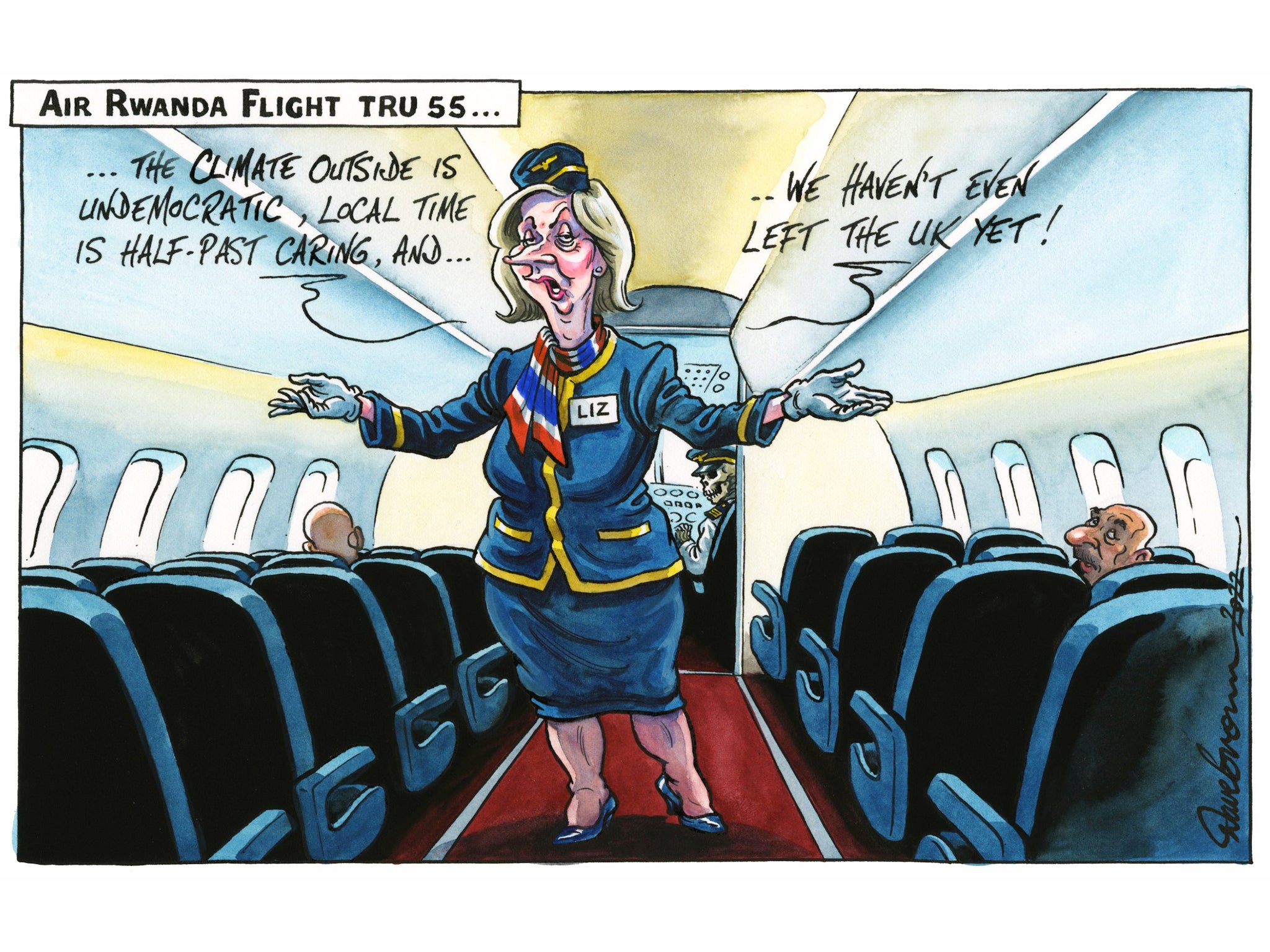The most shameful civilian flight in British history has been postponed, thanks to an out-of-hours judge at the European Court of Human Rights. It was, as we know, en route to Rwanda. The fact that it has been postponed by judicial intervention doesn’t lessen the symbolic impact of a founding signatory to the United Nations, and to the European conventions on refugees, straining every sinew to abnegate a responsibility it solemnly entered into after the last world war.
In pursuing this deportation, not only has Britain definitively broken its international legal obligations, it has hurtled through a moral crash barrier. This is the act of a government that has made sadism a principle on which policy is written. As the Archbishop of Canterbury says: “The shame is our own because our Christian heritage should inspire us to treat asylum seekers with compassion, fairness and justice, as we have for centuries.”
Apparently, the policy is popular with some MPs and some voters. They are entitled to their view but will have to live with their conscience. Yet the Rwanda policy is a failure already, on its own terms. As a supposed deterrent – a description that reveals much about the government’s true intent – it has not worked, a fact made plain by the number of asylum seekers crossing the Channel on Tuesday even as the flight to Africa was set to take off.
It is perfectly fair to say that not all asylum seekers are genuine and that public confidence in migration procedures is essential. Although the national mood towards inward migration has mellowed since Brexit bequeathed a severe and inflationary labour shortage, many still feel strongly about “taking back control” of Britain’s borders.
All sides agree that the people-traffickers are risking other people’s lives in the English Channel. This is all true. However – and leaving any moral considerations aside – the fact is that the Rwanda policy isn’t working as a deterrent, and probably never will. Even if a high proportion of those arriving in the UK seeking asylum were to be processed in Rwanda, a large number would still not be sent there, and so desperate are the refugees to get across the English Channel that they will still risk their lives, even against relatively unfavourable odds.
More migrants, of all kinds, will find different routes and try much harder to evade the authorities, and then disappear into a twilight world of casual work and unregulated lodgings, and very possibly fall victim to exploitation by the criminal world. They and their families will not have easy access to the NHS or schools – or social security for that matter – despite the popular myths.
At the moment, women and children are in any case entirely excluded from the Rwanda deportation scheme. Despite Priti Patel’s promise of a publicity blitz to deter people from attempting the journey to the UK, they will still come. The Rwanda plan looks doomed to become an irrelevance and a costly one at that. The judicial review in July might well strike much of it down as incompatible with UN and European conventions and treaties. Then the planes would be sent again, to bring back any who had been deported.
Such is the chaos at the moment about sending refugees to Rwanda that the plan has been derided as “farcical” even by those who favour it. So it obviously is. The statistics on migration put things into a stark and unflattering perspective. In the year to June 2021, some 573,000 people migrated to the UK, and 334,000 people emigrated from it, resulting in net migration of 239,000 people – all perfectly legally.
To keep up to speed with all the latest opinions and comment sign up to our free weekly Voices Dispatches newsletter by clicking here
Estimates vary on the extent of so-called illegal migration (though the right to claim asylum is unlimited and lawful) but Migration Watch UK, an organisation that is to say the least not especially warm to the cause, puts it at around 30,000 per year. All of this in a country with a population of around 67 million. Against that, a few hundred or even a few thousand migrants sent to Kigali for processing was always going to be negligible. The scheme will bring about maximum human suffering for minimal effect, but a promising political premium for the government – or so it thinks.
Boris Johnson claims that tens of thousands will be dispatched to central Africa, but now he seems to suggest he will need further legislative change, and a de facto withdrawal from the European Convention on Human Rights, if his MPs allow him to. His pledge to remove migrants was always framed within a carefully unspecified time frame, and with little evidence that Rwanda had the capacity to cope. Theoretically, the number of people who can be expelled is “uncapped”; practically, it is very much more constrained.
All Liz Truss, the foreign secretary, would say is that this official human-trafficking programme would subject a “significant” number to the distressing treatment it promises.
About £500,000 was to be spent on this bizarre, performative, near-ghost flight, which is public money that could have been put to much better uses than paying for ammo in a culture war. A net total of zero refugees have been packed off to Africa – a humiliation brought about not by “lefty lawyers” but ministerial incompetence. Tory MPs may well ask how long they can go on like this.
It is remarkable that elements in British society – in a nation that owes so much to migration for its development and prosperity, from the industrial revolution onwards – seem to view people from abroad with such suspicion, even hatred. The grounding of this flight is a moment for reflection.







Join our commenting forum
Join thought-provoking conversations, follow other Independent readers and see their replies
Comments